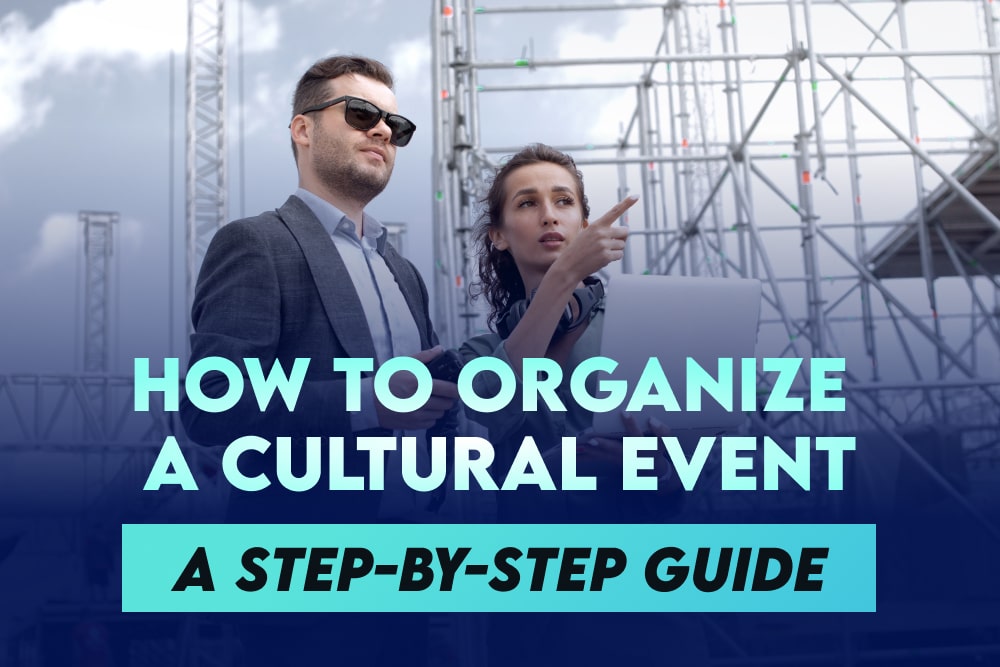

Head of HR at Rent For Event

Head of HR at Rent For Event
Welcome to the exciting world of organizing a cultural event! Whether it’s a school event or a community gathering, we’ve got you covered with our step-by-step guide.
A cultural event is like a big party celebrating different cultures and traditions. Set up a stage, and if you don’t have one, consider stage rental options. Decorate with symbols and colors representing various cultures to create a magical atmosphere.
The highlight of the event is the cultural program, featuring dances, music, games, and workshops. Embrace diversity, celebrate traditions, and have a blast at your cultural extravaganza! Let’s start and make it a massive success!

Cultural events are like big, happy parties where you celebrate different cultures and traditions. They help you understand and appreciate each other’s unique ways of living. It’s like having a fun time while learning about our world’s beautiful diversity!
Cultural events are powerful tools that celebrate diversity, strengthen community ties, and promote mutual understanding. They enable you to appreciate the beauty of our differences and come together in harmony.
Planning a cultural event is like going on an exciting adventure where you get to be creative and thoughtful. Follow these steps to create an awesome event that everyone will enjoy and remember, whether it’s for school or your community.
When planning a cultural event, two important choices can make it awesome: choosing the perfect place and thinking about the stage. The place sets the scene, and a great stage decoration for cultural program makes the performances even better. It’s like creating a magical experience for everyone to enjoy and remember!
To make a cultural event super cool and unforgettable, you can decorate it in an exciting way! You use lots of colors, special things like props and fabrics, and things that show different cultures. When people see the decorations, they will feel like they are in a magical world of traditions and diversity.
Let’s try some awesome and affordable ideas that everyone will love!
Planning a cultural event is like making a colorful masterpiece with different cultures and fun stuff. When you carefully plan the schedule, performances, and activities, you create an amazing cultural program that people will love. Let’s learn why planning is important and see some cool examples of activities to make your event a big hit!
1. Importance of Planning the Schedule, Performances, and Activities:
2. Examples of Cultural Program Activities:
3. Emphasizing Variety and Inclusivity in the Program:
To make your cultural event super successful, you need to tell lots of people about it! You can do this by using different ways like social media, asking your community to join, and teaming up with others. When more people know about your event, they’ll be excited to come and celebrate all the different cultures with you!
Effective Marketing Strategies to Reach the Target Audience:
Utilize Various Promotion Channels:
Encourage Community Involvement and Word-of-Mouth Promotion:
To make your cultural event a big hit, remember two important things – the plans and the helpers! A great team organizes everything, like tickets, safety, and parking, so everyone has a fun and smooth time at the event. It’s like having lots of friends working together to create an awesome celebration!
Managing Logistics:
Importance of Recruiting and Organizing Volunteers:
By efficiently managing logistics, from ticketing and security to parking and crowd control, you can create a safe and enjoyable environment for your cultural event.
After you’ve worked really hard to put together your cultural event, it’s important to see how well it went. You can do this by asking the people who came, the sponsors, and the people who were part of the event. This helps you understand what was great and what you can improve for the next time. Learning from each event makes the next one even more amazing and fun!
Methods to Measure the Success of a Cultural Event:
Analyzing Feedback from Attendees, Sponsors, and Participants:
Importance of Learning from Previous Events for Improvement:
By employing methods to measure success, analyzing valuable feedback, and learning from previous events, you can continuously improve your cultural celebrations and create more enriching experiences for everyone involved.
Organizing cultural events is like weaving a beautiful tapestry of unity and diversity, bringing people together to cherish different traditions and customs. By carefully planning every detail, from the venue to the stage, you can create a captivating experience that leaves a lasting impact on your audience.
To ensure a captivating cultural program, consider Rent For Event for stage lighting and stage sound system rental. Their professional services will elevate your performances and presentations, adding a touch of magic to your event.